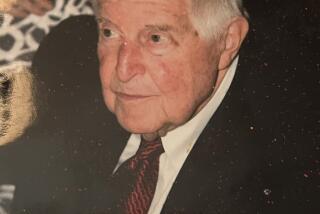Jack Lorenz dies at 69; nature preservation advocate
Jack Lorenz, who became a nationally prominent advocate for nature preservation during 18 years as executive director of the Izaak Walton League and who developed a code of ethics governing outdoor activities, died of a stroke March 2 at Scripps Mercy Hospital in San Diego, where he was visiting. He was 69 and lived in Woodstock, Va.
In 1974, Lorenz became leader of the Izaak Walton League, a conservation group long associated with fishermen, and made it a leading voice in the nation’s environmental debates.
He was best known for establishing the league’s outdoor ethics program, which is based on a simple but far-reaching credo: “We must leave our woods, waters and wildlife better than we found them, and we must dedicate ourselves to inspiring others to do the same.”
Lorenz helped launch stream cleanup programs across the country, often with the participation of schoolchildren and senior citizens, and formed partnerships with businesses to preserve company-owned land in its natural state. He was a founder of an influential coalition of environmental organizations now known as the Green Group.
As off-road vehicles became increasingly popular in the 1980s, Lorenz put pressure on manufacturers to change their advertising, which often depicted people barreling heedlessly through forests and streams.
“He was the nation’s spokesman for many years on the ethical management of hunting, angling and off-road vehicle use,” said Paul W. Hansen, who was executive director of the Izaak Walton League from 1995 to 2007. “He was one of the nation’s most well-known and popular environmentalists.”
Affable and easygoing, Lorenz had the rare ability to find common ground among such disparate groups as the Sierra Club, the National Rifle Assn., businesses and recreational sportsmen. He denounced the thoughtless despoilment of the outdoors without condemning hunters or fishermen.
“When we silently countenance slob hunting in a friend,” he said, “we become slobs ourselves.”
A dedicated fisherman, Lorenz accomplished a lifelong goal of fishing in all 50 states and each of Canada’s 10 provinces. But in the 1970s he challenged fellow members of the angling fraternity when he spoke out against killing fish caught during tournaments.
He was considered a kook at first, but he was quietly persuasive and helped popularize the slogan “Don’t Kill Your Catch.” Today, “catch and release” is an established practice in sport fishing, and virtually all tournaments require hooked fish to be returned to the water unharmed.
Lorenz’s work was guided by the principle that every step into the wild should be taken with understanding and respect.
John Robbins Lorenz was born March 14, 1939, in St. Louis and grew up fishing on the rivers and lakes of Missouri and Arkansas. He graduated from the University of Tulsa in 1961 and worked early in his career for Falstaff Brewing Corp. in St. Louis.
In 1973, when Lorenz was named editor of Outdoor America, the publication of the Izaak Walton League, he loaded his family into a Volkswagen Beetle and drove to Washington, D.C. A year later, he became executive director of the league, which is named for the 17th-century author of “The Compleat Angler.”
Lorenz rarely stepped into the world of politics, but he made an exception when President Reagan nominated James Watt as Interior secretary in 1981.
“We’ve never done anything like this before,” he said. “But our members simply can’t see this man as a responsible steward of the environment. People say, ‘He hasn’t done anything yet.’ But I don’t have to see the body in the water if I can smell it.”
After a severe heart attack, Lorenz resigned as executive director of the league in 1992 but continued to write for its publications and to refine its outdoor ethics programs.
Survivors include his wife of 45 years, Margaret Caldwell Lorenz of Woodstock; two sons, John C. Lorenz of Vallejo, Calif., and Stephen F. Lorenz of Accokeek, Md.; two brothers; three sisters; and a grandson.
Schudel writes for the Washington Post.
More to Read
Start your day right
Sign up for Essential California for the L.A. Times biggest news, features and recommendations in your inbox six days a week.
You may occasionally receive promotional content from the Los Angeles Times.






